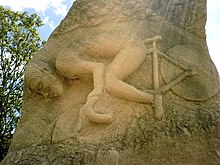Roger Rivière

Roger Rivière (born February 23, 1936 in Saint-Étienne , † April 1, 1976 in Saint-Galmier ) was a French cyclist and three-time world champion .
Cycling career
Roger Rivière was considered one of the greatest French cycling talents at the beginning of his career. He started cycling in 1953. After attending several races on the track in his hometown, he really wanted to try this sport himself and started in the debutants' class. With three victories, he was already successful in his first year. In 1954 he already won ten winning ribbons and then turned more to track racing in the following season. In 1955 he beat at the French Championships in Paris Parc des Princes in the individual pursuit two years older than Jacques Anquetil . In 1957, at the age of only 21, he became world champion in the single pursuit on the track , after having switched to the pros shortly before. He was able to successfully defend this title in the following two years. He also set a world hour record twice on the Milan Vigorelli railway : in 1957 he improved Ercole Baldini's old record from the previous year by 523 meters to 46.923 kilometers (he also improved the world records over 10 and 20 kilometers), again two years later on 47.347 kilometers. In the same year he was voted France's Sportsman of the Year (“ Champion des champions ”) by the sports newspaper L'Équipe .
Rivière was also a successful racing driver on the road: as an amateur, he had already won the Tour of Europe and stage victories in other races such as the Route de France . He won several stages at the Vuelta and the Tour de France . In 1956 he won the overall ranking of the Tour d'Europe . At the Tour de France 1959 , the French team was divided internally: Rivière and Anquetil watched each other so closely that the Spaniard Federico Bahamontes achieved overall victory; The two big favorites Anquetil and Rivière only took 3rd and 4th place behind another Frenchman, Henry Anglade , who hadn't been considered.
A year later, Rivière was the only favorite in the race - Anquetil had not started - and won the individual time trial and two stages. On July 10, 1960, Rivière fell on the 14th stage from Millau to Avignon on the descent from Col du Perjuret into a 30-meter deep gorge and seriously injured his head and spine. Because there were drugs containing prohibited substances in his shirt pockets, there was the suspicion that his ability to react was impaired by the effects of these drugs; Rivière later admitted himself to have taken strong painkillers and to have been doped during his record run in 1958.
As early as 1958, Rivière fell badly at the six-day race in Paris after a collision with Jacques Anquetil and Ferdinando Terruzzi and broke his pelvis, so that at the time it was feared that he would have to end his career.
Life after the accident
After the accident, Roger Rivière was severely disabled, sat in a wheelchair and became addicted to drugs. First he opened the café “Le Vigorelli” in his hometown of Saint-Étienne, named after the track on which he set his records. Later he ran a car repair shop and a campsite.
Roger Rivière died of cancer at the age of 40.
literature
- Jean-Paul Ollivier: La Tragedie du “Parjour”. La véridique Histoire de Roger Riviere. l'Aurore, Grenoble 1991, ISBN 2-903950-52-0 .
- André Piat: Roger Rivière. Le vélo c'était sa vie. Piat, Saint Etienne 2008.
Individual evidence
- ↑ a b Presidium of the Cycling Section of the GDR (ed.): Cycling Week . No. 34/1957 . Sportverlag, Berlin, p. 12 .
- ↑ Miroir du Cyclisme , April 1961
- ↑ Cyclisme Dopage "Les Aveux" accessed on 6 May 2010 (French).
- ^ Walter Lemke: Fausto Coppi. 20 years of international cycling. The life path of the Italian cyclist. Fuchs-Verlag, Miesbach 1999, ISBN 3-00-004687-9 , p. 578.
Web links
- radsport-seite.de: "The tragedy of the huge talent Roger Rivière"
- Memoire du cyclisme: "Roger Rivière"
- Roger Rivière in the Radsportseiten.net database
- Roger Rivière in the Tour de France database(French / English )
| personal data | |
|---|---|
| SURNAME | Rivière, Roger |
| BRIEF DESCRIPTION | French cyclist |
| DATE OF BIRTH | February 23, 1936 |
| PLACE OF BIRTH | Saint-Etienne , Loire department , France |
| DATE OF DEATH | April 1, 1976 |
| Place of death | Saint-Galmier , Loire department , France |


